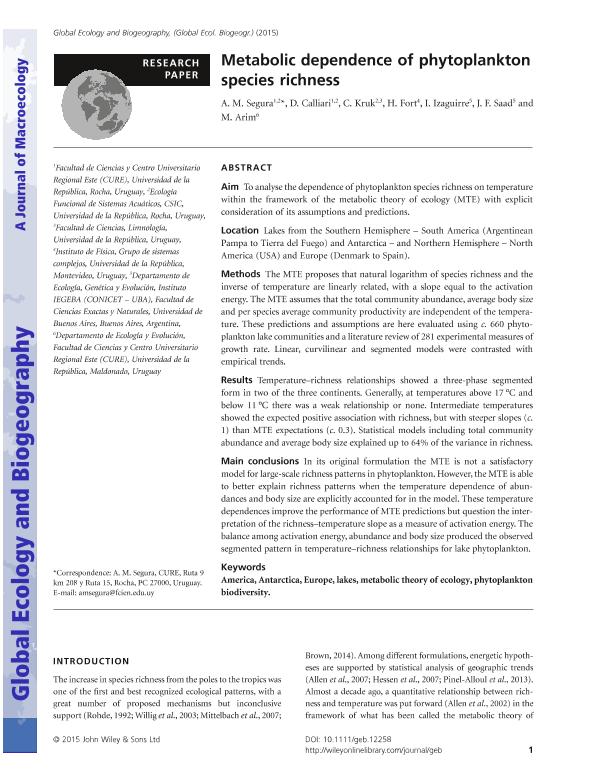Artículo
Metabolic dependence of phytoplankton species richness
Segura, A. M.; Calliari, Danilo Luis; Kruk, C.; Fort, H.; Izaguirre, Irina ; Saad, Juan Francisco
; Saad, Juan Francisco ; Arim, M.
; Arim, M.
 ; Saad, Juan Francisco
; Saad, Juan Francisco ; Arim, M.
; Arim, M.
Fecha de publicación:
01/2015
Editorial:
Wiley Blackwell Publishing, Inc
Revista:
Global Ecology and Biogeography
ISSN:
1466-822X
e-ISSN:
1466-8238
Idioma:
Inglés
Tipo de recurso:
Artículo publicado
Clasificación temática:
Resumen
Aim To analyse the dependence of phytoplankton species richness on temperature within the framework of the metabolic theory of ecology (MTE) with explicit consideration of its assumptions and predictions. Location Lakes from the Southern Hemisphere – South America (Argentinean Pampa to Tierra del Fuego) and Antarctica – and Northern Hemisphere – North America (USA) and Europe (Denmark to Spain). Methods The MTE proposes that natural logarithm of species richness and the inverse of temperature are linearly related, with a slope equal to the activation energy. The MTE assumes that the total community abundance, average body size and per species average community productivity are independent of the temperature. These predictions and assumptions are here evaluated using c. 660 phytoplankton lake communities and a literature review of 281 experimental measures of growth rate. Linear, curvilinear and segmented models were contrasted with empirical trends. Results Temperature–richness relationships showed a three‐phase segmented form in two of the three continents. Generally, at temperatures above 17 °C and below 11 °C there was a weak relationship or none. Intermediate temperatures showed the expected positive association with richness, but with steeper slopes (c. 1) than MTE expectations (c. 0.3). Statistical models including total community abundance and average body size explained up to 64% of the variance in richness. Main conclusions In its original formulation the MTE is not a satisfactory model for large‐scale richness patterns in phytoplankton. However, the MTE is able to better explain richness patterns when the temperature dependence of abundances and body size are explicitly accounted for in the model. These temperature dependences improve the performance of MTE predictions but question the interpretation of the richness–temperature slope as a measure of activation energy. The balance among activation energy, abundance and body size produced the observed segmented pattern in temperature–richness relationships for lake phytoplankton.
Archivos asociados
Licencia
Identificadores
Colecciones
Articulos(IEGEBA)
Articulos de INSTITUTO DE ECOLOGIA, GENETICA Y EVOLUCION DE BS. AS
Articulos de INSTITUTO DE ECOLOGIA, GENETICA Y EVOLUCION DE BS. AS
Citación
Segura, A. M.; Calliari, Danilo Luis; Kruk, C.; Fort, H.; Izaguirre, Irina; et al.; Metabolic dependence of phytoplankton species richness; Wiley Blackwell Publishing, Inc; Global Ecology and Biogeography; 24; 4; 1-2015; 472-482
Compartir
Altmétricas



